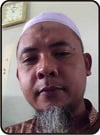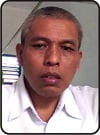Effectiveness of Quantum Learning for Teaching Linear Program at the Muhammadiyah Senior High School of Purwokerto in Central Java, Indonesia
Abstract
ABSTRACT: For most Indonesian students, Mathematics is still regarded as a difficult and scaring subject compared to other subjects. Therefore, there should be a learning strategy which can empower all the available potential to achieve the learning objectives as a whole. In relation to the learning process of Mathematics, the choice of learning strategy is also based on the achievement of the learning objectives. One way of realizing that is through the use of quantum learning. The aim of this research is: (1) to find out the effectiveness of quantum learning for teaching mathematics; and (2) to analyze the difference the result of quantum learning and that of the conventional one. Two classes of grade X were randomly taken as sample out of five available, one class being the experimental group and the other control. This random sampling was due to the fact that students are distributed evenly on ability basis. Data was taken using test and non-test techniques (observation and questionnaire). To find out the effectiveness of this quantum learning, descriptive analysis was used toward: (1) student’s activity during the learning process; (2) the teacher’s ability in managing the learning process; (3) student’s response toward the learning model; and (4) the student’s mastery. While ANAKOVA inferential analysis was used to test the difference on the learning achievement. The result of the two analysis were that quantum learning was effective and there was significant difference in which the quantum learning gave a better learning achievement than the conventional one.
KEY WORDS: Teaching and learning effectiveness, Mathematics subject, quantum learning concept, and modern and conventional learning.


About the Authors: Kusno, M.Pd. and Joko Purwanto, M.Si. are Lecturers at the Department of Mathematics Education, Faculty of Education and Teacher Training UMP (Muhammadiyah University of Purwokerto), Jalan Raya Dukuhwaluh, PO Box 202, Purwokerto 53182, Central Java, Indonesia. They can be reached at: pakusno@yahoo.com and jokotien@gmail.com
How to cite this article? Kusno & Joko Purwanto. (2011). “Effectiveness of Quantum Learning for Teaching Linear Program at the Muhammadiyah Senior High School of Purwokerto in Central Java, Indonesia” in EDUCARE: International Journal for Educational Studies, Vol.4(1) August, pp.83-92. Bandung, Indonesia: Minda Masagi Press owned by ASPENSI in Bandung, West Java; and FKIP UMP in Purwokerto, Central Java, ISSN 1979-7877.
Chronicle of the article: Accepted (June 30, 2011); Revised (July 30, 2011); and Published (August 17, 2011).
Full Text:
PDFReferences
Agung, I.G.N. (1998). Metodologi Penelitian: Pengertian dan Pemakaian Praktis. Jakarta: PT Gramedia.
Dahar, R.W. (1996). Teori-teori Belajar. Jakarta: Ditjendikti Depdikbud RI [Direktorat Jenderal Pendidikan Tinggi, Departemen Pendidikan dan Kebudayaan, Republik Indonesia].
Degeng. (2001). “Belajar-Mengajar Kuantum”. Paper presented in the National Conference at UNIPA (University of PGRI Adibuana) in Surabaya, East Java, Indonesia: 21 April.
De Porter. (2000). Quantum Teaching. Bandung: Kaifa, Translation.
De Porter. (2001). Quantum Learning. Bandung: Kaifa, Translation.
Kusno. (2002). “Pengembangan Perangkat Pembelajaran Matematika dengan Pembelajaran Model Kuantum pada Pokok Bahasan Program Linear di Kelas 2 SMU [Sekolah Menengah Umum]”. Paper presented in the Comprehensive Discussion at Postgraduate Program UNESA (Surabaya State University), East Java, Indonesia.
Marpaung. (2001). “Prospek RME untuk Pembelajaran Matematika di Indonesia”. Paper presented in the National Conference at UNESA (Surabaya State University), East Java, Indonesia: 24 February.
Muhaimin. (2001). “Problematika Pendidikan di Era Otonomi Daerah”. Paper presented in the National Conference at UNESA (Surabaya State University), East Java, Indonesia: 19 May.
Netter, John & William Wassernmen. (1974). Applied Linier Statistical Models. Illions: Richard D. Irwin Inc.
Russefendi. (1992). Pendidikan Matematika di Indonesia. Bandung: IKIP [Institut Keguruan dan Ilmu Pendidikan] Bandung Press.
Slavin, Robert E. (2000). Educational Psychology: Theory and Practice. Massachussetts: Allyn and Bacon Publishers, 10th edition.
Soedjadi, R. (1994). “Memantapkan Matematika Sekolah sebagai Wahana Pendidikan dan Pembudayaan Penalaran” in Media Pendidikan Nasional, No.4, Th.3. Surabaya, Indonesia: PPs IKIP [Program Pascasarjana Institut Keguruan dan Ilmu Pendidikan] Surabaya.
Soedjadi, R. (2001). “Pemanfaatan Realitas dan Lingkungan dalam Pembelajaran Matematika”. Paper presented in the National Conference at UNESA (Surabaya State University), East Java, Indonesia: 24 February.
Suryanto. (1987). “Penelitian Pendidikan Matematika di Indonesia” in Marpaung [ed]. Pendidikan Matematika. Yogyakarta: Tiara Wacana.
Thiagarajan, Semmel D.S. (1974). Instructional Development for Training Teachers of Exceptional Children: A Source Book. Bloomington: Central for Innovation on Teaching.
EDUCARE: International Journal for Educational Studies. Ciptaan disebarluaskan di bawah Lisensi Creative Commons Atribusi-BerbagiSerupa 4.0 Internasional
